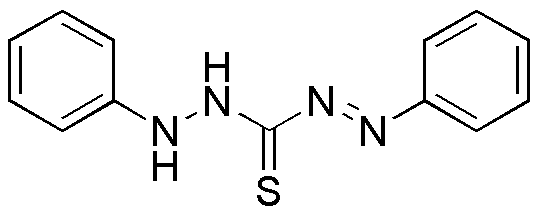Dithizone is widely utilized in research focused on:
- Metal Ion Detection: Commonly used as a reagent in analytical chemistry for the detection and quantification of metal ions, particularly lead, mercury, and cadmium. Its colorimetric properties allow for easy visual identification.
- Soil and Water Testing: Employed in environmental science to assess contamination levels in soil and water samples. Dithizone helps in identifying heavy metal pollution, providing crucial data for environmental monitoring.
- Pharmaceutical Applications: Used in the pharmaceutical industry for the development of drugs that target heavy metal poisoning. Its ability to form stable complexes with toxic metals makes it a valuable tool in toxicology research.
- Biochemical Research: Acts as a chelating agent in biochemical studies, facilitating the investigation of metal-dependent enzymes and proteins. This application is essential for understanding various biological processes.
- Industrial Applications: Utilized in the mining industry for the extraction and analysis of precious metals. Dithizone aids in the recovery process by selectively binding to specific metal ions, enhancing the efficiency of metal recovery.
General Information
Properties
Safety and Regulations
Applications
Dithizone is widely utilized in research focused on:
- Metal Ion Detection: Commonly used as a reagent in analytical chemistry for the detection and quantification of metal ions, particularly lead, mercury, and cadmium. Its colorimetric properties allow for easy visual identification.
- Soil and Water Testing: Employed in environmental science to assess contamination levels in soil and water samples. Dithizone helps in identifying heavy metal pollution, providing crucial data for environmental monitoring.
- Pharmaceutical Applications: Used in the pharmaceutical industry for the development of drugs that target heavy metal poisoning. Its ability to form stable complexes with toxic metals makes it a valuable tool in toxicology research.
- Biochemical Research: Acts as a chelating agent in biochemical studies, facilitating the investigation of metal-dependent enzymes and proteins. This application is essential for understanding various biological processes.
- Industrial Applications: Utilized in the mining industry for the extraction and analysis of precious metals. Dithizone aids in the recovery process by selectively binding to specific metal ions, enhancing the efficiency of metal recovery.
Documents
Safety Data Sheets (SDS)
The SDS provides comprehensive safety information on handling, storage, and disposal of the product.
Product Specification (PS)
The PS provides a comprehensive breakdown of the product’s properties, including chemical composition, physical state, purity, and storage requirements. It also details acceptable quality ranges and the product's intended applications.
Certificates of Analysis (COA)
Search for Certificates of Analysis (COA) by entering the products Lot Number. Lot and Batch Numbers can be found on a product’s label following the words ‘Lot’ or ‘Batch’.
*Catalog Number
*Lot Number
Certificates Of Origin (COO)
This COO confirms the country where the product was manufactured, and also details the materials and components used in it and whether it is derived from natural, synthetic, or other specific sources. This certificate may be required for customs, trade, and regulatory compliance.
*Catalog Number
*Lot Number
Safety Data Sheets (SDS)
The SDS provides comprehensive safety information on handling, storage, and disposal of the product.
DownloadProduct Specification (PS)
The PS provides a comprehensive breakdown of the product’s properties, including chemical composition, physical state, purity, and storage requirements. It also details acceptable quality ranges and the product's intended applications.
DownloadCertificates of Analysis (COA)
Search for Certificates of Analysis (COA) by entering the products Lot Number. Lot and Batch Numbers can be found on a product’s label following the words ‘Lot’ or ‘Batch’.
*Catalog Number
*Lot Number
Certificates Of Origin (COO)
This COO confirms the country where the product was manufactured, and also details the materials and components used in it and whether it is derived from natural, synthetic, or other specific sources. This certificate may be required for customs, trade, and regulatory compliance.

